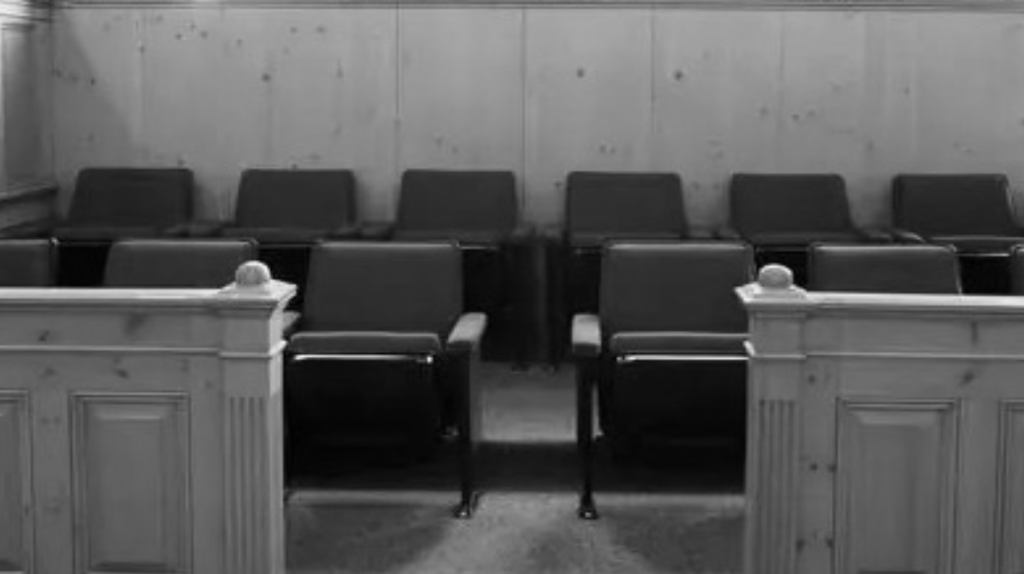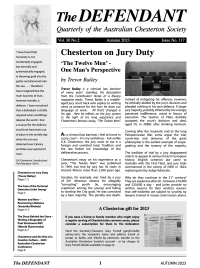Trevor Bailey is a criminal law barrister of many years’ standing. His description from the Contributors’ Notes of a literary magazine reads: Trevor Bailey is a middle- aged jury court hack who aspires to writing verse as penance for the hurt he does our language at work. All that’s changed is his age. Here he reflects on the jury system in the light of his long experience and Chesterton’s famous essay, “The Twelve Men”.

As a criminal law barrister, I feel at home in a jury court – it is my workshop – but unlike G.K. Chesterton, the jury room to me is a foreign and unvisited land. Tradition and the law forbid me knowledge of the deliberative process.
Chesterton’s essay on his experience as a juror, “The Twelve Men,” was published in 1909, but trial by jury has its roots in Ancient Athens more than 2,500 years ago.
Socrates, for example, was tried by a jury of 501 Athenian citizens for allegedly “corrupting” youth (ie, encouraging scepticism among the young) and failing to worship the City gods. He was convicted by a bare majority. The penalty was death.
Instead of mitigating his offences, however, he ethically abided by the jury’s decision and pleaded nothing in his own defence. A larger jury majority, possibly inflamed by his wrongly perceived indifference, voted in favour of execution. The teacher of Plato dutifully accepted the court’s decision and died, aged 70, in 399BC after drinking hemlock.
Coming after the traumatic end to the long Peloponnesian War, some argue the trial, conviction and sentence of the great philosopher is the earliest example of scape- goating and the tyranny of the majority.
The tradition of trial by a jury disappeared only to re-appear at various times in European history. English common law came to Australia with the First Fleet, and jury trials commenced in the colony of NSW in 1824, replacing trial by Judge Advocate.
Why do they continue in the 21st century? Theyareexpensiveafterall–between$10,000 and $20,000 a day – and juries provide no written reasons for their verdicts; reasons that self-evidently are subject to scrutiny by lawyers trained in reason (and reason alone).
Why not leave the criminal justice system in the hands of the expeditious? Is it because to do so might invite expediency?
Judges when directing juries on the law before inviting them to retire and consider their verdicts are obliged to tell them to act only on the evidence. But what at the end of a trial amounts to “evidence”? “The Twelve Men” demonstrates an answer:
“The trend of our epoch up to this time has been consistently towards socialism and professionalism… Many legalists have declared that the untrained jury should be altogether supplanted by the trained Judge.”
This remains the cry from some legal quarters today. The Hon Justice McClelland, formerly of the NSW Supreme Court, advocated along these lines in 2011, for example. His Honour said that evidence is sometimes too complicated for lay people.
Looking more, seeing less
But Chesterton’s comment was:
“Now, if this world of ours were really what is called reasonable, I do not know that there would be any fault to find with this. But the true result of all experience and the true foundation of all religion is this…the more a man looks at a thing, the less he can see it, and the more a man learns a thing the less he knows it.
“The Fabian argument of the expert…would be absolutely unanswerable if it were really true that a man who studied a thing and practised it every day went on seeing more and more of its significance. But he does not. He goes on seeing less and less of its significance.”
Of legal practitioners and officials, Chesterton says:
“Strictly they do not see the prisoner in the dock; all they see is the usual man in the usual place. They do not see the awful court of judgment; they only see their own workshop. Therefore, the instinct of Christian civilisation has most wisely declared that…men shall come in who can see the court and the crowd… and see it all as one sees a new picture or a ballet hitherto unvisited.
“Our civilisation has decided… that determining guilt or innocence of men is a thing too important to be trusted to trainedmen…[W]henitwishesanythingdonewhichisreally serious, it collects twelve of the ordinary men standing round. The same thing was done, if I remember right, by the founder of Christianity.”
Juries and the Cardinal Pell case
The late Cardinal Pell was tried and found guilty by a Victorian jury. He served 405 days in prison before the High Court unanimously overturned his conviction, returning to him the presumption of innocence.
I read a summary of the evidence. The doubts were many and reasonable. The jury had made an egregious error. The enormity of their mistake was repeated by the majority of the Victorian Court of Appeal, which affirmed the guilty verdict in a 2:1 decision.
Interestingly, the dissenting voice, Justice Weinberg, was the only lawyer with extensive experience in criminal courts. It took a judge with faith in the wisdom of the jury system to see that this particular jury had been unwise: a paradox, and one Chesterton would have been alive to for reasons that follow.
But first, a brief summary of the background to Regina v Pell: The Cardinal was a focus of the Royal Commission into Institutional Child Sexual Abuse instituted by Prime Minister Julia Gillard. The aforementioned Justice McClelland was appointed commissioner. All aspects of the investigation received wide media attention, especially by Fairfax newspapers and the ABC. Some journalists (Louise Milligan, for example) were active in disseminating distrust of Catholic Church institutions in general and Cardinal Pell in particular.
Prime Minister Scott Morrison publicly apologised to “all victims” of child sexual abuse, adding that the Australian people “believed” them in their claims. These and other factors made for a heated climate in which to conduct a cool and thorough investigation of the complaints. The prejudice was pronounced, pervasive, and persuasive.
The result? I believe, like Chesterton, “that the more [a juror with a mind awash with media prejudice] looks at a thing, the less he can see it, and the more a [juror] learns a thing the less he knows it.”
Was the jury biased against the accused because of Catholic Church misdeeds of the past? Shades of Socrates were it so. Did they “go on seeing less and less of its significance,” where “it” was the incredibility of the complainant’s story?
Evidence, therefore, is something of the real world, not the false world an angry imagination can conjure.
Pell’s case is one of the greatest miscarriages of justice in our country’s history. Fortunately juries very rarely get things quite so wrong, at least such that an innocent person is wrongly convicted. “It is better that 10 guilty men escape than one innocent suffer,” is a staple of our common law, and Blackstone’s Ratio embraces the inevitability of human failure.
This is where lawyers have been useful. By carefully examining the mistakes of the past, an intricate system of evidentiary rules and courtroom procedure has developed over centuries to minimise the risk of the innocent suffering. It is an ongoing challenge, for times change, as do public attitudes.
Were I to face a serious criminal charge, I’d take “twelve of the ordinary men standing round” as my judges any day.
